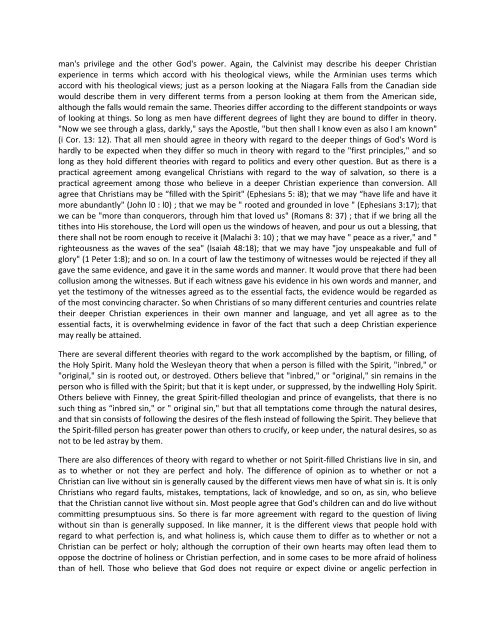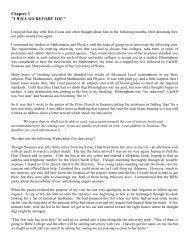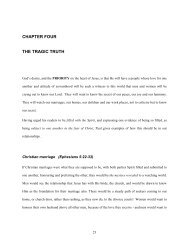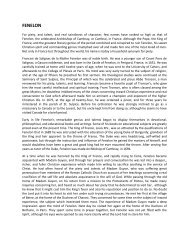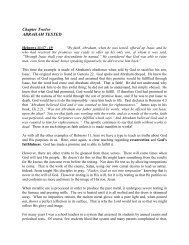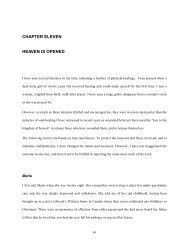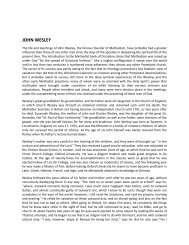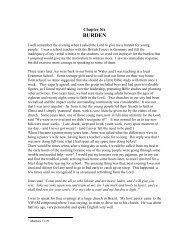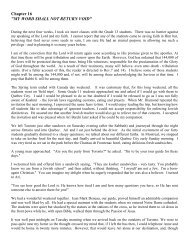INTRODUCTION - Gareth Evans Ministries
INTRODUCTION - Gareth Evans Ministries
INTRODUCTION - Gareth Evans Ministries
You also want an ePaper? Increase the reach of your titles
YUMPU automatically turns print PDFs into web optimized ePapers that Google loves.
man's privilege and the other God's power. Again, the Calvinist may describe his deeper Christianexperience in terms which accord with his theological views, while the Arminian uses terms whichaccord with his theological views; just as a person looking at the Niagara Falls from the Canadian sidewould describe them in very different terms from a person looking at them from the American side,although the falls would remain the same. Theories differ according to the different standpoints or waysof looking at things. So long as men have different degrees of light they are bound to differ in theory."Now we see through a glass, darkly," says the Apostle, "but then shall I know even as also I am known"(i Cor. 13: 12). That all men should agree in theory with regard to the deeper things of God's Word ishardly to be expected when they differ so much in theory with regard to the "first principles," and solong as they hold different theories with regard to politics and every other question. But as there is apractical agreement among evangelical Christians with regard to the way of salvation, so there is apractical agreement among those who believe in a deeper Christian experience than conversion. Allagree that Christians may be “filled with the Spirit" (Ephesians 5: i8); that we may “have life and have itmore abundantly" (John l0 : l0) ; that we may be " rooted and grounded in love " (Ephesians 3:17); thatwe can be "more than conquerors, through him that loved us" (Romans 8: 37) ; that if we bring all thetithes into His storehouse, the Lord will open us the windows of heaven, and pour us out a blessing, thatthere shall not be room enough to receive it (Malachi 3: 10) ; that we may have " peace as a river," and "righteousness as the waves of the sea" (Isaiah 48:18); that we may have "joy unspeakable and full ofglory" (1 Peter 1:8); and so on. In a court of law the testimony of witnesses would be rejected if they allgave the same evidence, and gave it in the same words and manner. It would prove that there had beencollusion among the witnesses. But if each witness gave his evidence in his own words and manner, andyet the testimony of the witnesses agreed as to the essential facts, the evidence would be regarded asof the most convincing character. So when Christians of so many different centuries and countries relatetheir deeper Christian experiences in their own manner and language, and yet all agree as to theessential facts, it is overwhelming evidence in favor of the fact that such a deep Christian experiencemay really be attained.There are several different theories with regard to the work accomplished by the baptism, or filling, ofthe Holy Spirit. Many hold the Wesleyan theory that when a person is filled with the Spirit, "inbred," or"original," sin is rooted out, or destroyed. Others believe that "inbred," or "original," sin remains in theperson who is filled with the Spirit; but that it is kept under, or suppressed, by the indwelling Holy Spirit.Others believe with Finney, the great Spirit-filled theologian and prince of evangelists, that there is nosuch thing as “inbred sin," or " original sin," but that all temptations come through the natural desires,and that sin consists of following the desires of the flesh instead of following the Spirit. They believe thatthe Spirit-filled person has greater power than others to crucify, or keep under, the natural desires, so asnot to be led astray by them.There are also differences of theory with regard to whether or not Spirit-filled Christians live in sin, andas to whether or not they are perfect and holy. The difference of opinion as to whether or not aChristian can live without sin is generally caused by the different views men have of what sin is. It is onlyChristians who regard faults, mistakes, temptations, lack of knowledge, and so on, as sin, who believethat the Christian cannot live without sin. Most people agree that God's children can and do live withoutcommitting presumptuous sins. So there is far more agreement with regard to the question of livingwithout sin than is generally supposed. In like manner, it is the different views that people hold withregard to what perfection is, and what holiness is, which cause them to differ as to whether or not aChristian can be perfect or holy; although the corruption of their own hearts may often lead them tooppose the doctrine of holiness or Christian perfection, and in some cases to be more afraid of holinessthan of hell. Those who believe that God does not require or expect divine or angelic perfection in


